
The Google assistant
When we think of the Google search experience today—a rich panel of information on [Zika virus], or an alert telling you your flight is delayed—it’s striking to see how far things have come from the early days of 10 blue links. Many of these advances have been thanks to machine learning and artificial intelligence—specifically, areas like natural language processing, voice recognition and translation—and they have helped us build an increasingly useful and assistive experience for users. They are the ingredients that make Google speech recognition the most accurate in the world, and that let you take a picture of a sign in Chinese and see it translated into English.
Progress in all of these areas is accelerating, and we believe we are at a seminal moment. People are increasingly interacting naturally with Google, and aren’t just looking for the world’s information but actually expecting Google to help them with their daily tasks.
Which is why we’re pleased to introduce…the Google assistant.
The assistant is conversational—an ongoing two-way dialogue between you and Google that understands your world and helps you get things done. It makes it easy to buy movie tickets while on the go, to find that perfect restaurant for your family to grab a quick bite before the movie starts, and then help you navigate to the theater. It’s a Google for you, by you.
The assistant is an ambient experience that will work seamlessly across devices and contexts. So you can summon Google’s help no matter where you are or what the context. It builds on all our years of investment in deeply understanding users’ questions.
Today we gave a preview of two new products where you’ll soon be able to draw on the Google assistant.






